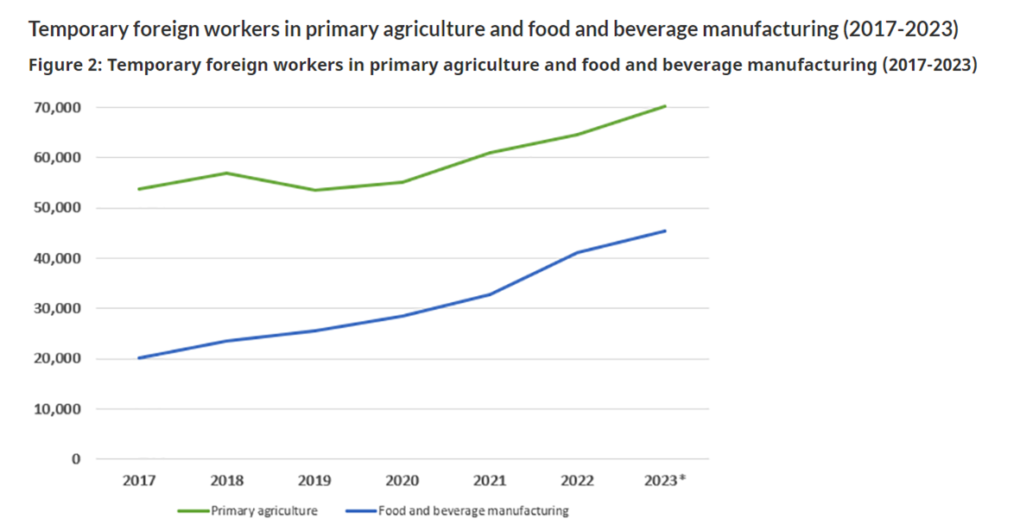By Elanor Copes
University of Saskatchewan Student
A Need for Workers or In Need of a Change?
Individuals are the backbone of agriculture. At the very core of our system, it is inarguable that people are the driving force for all Canadian food production. There is a widening gap currently between the positions needed on the ground and the Canadians willing and able to work in them. A common course of action for farmers is to utilize the Temporary Foreign Worker Program (TFWP), a program offered through the Government of Canada. Recently, there has been a magnifying glass on the TFWP, with the current government adjusting it and making the rules stricter. In this round of changes, agriculture was made exempt. However, with the current critical discourse, will it be forever? And if it isn’t, what does this mean for the agricultural industry?
The Role of the Temporary Foreign Worker Program in Canadian Agriculture
In Canada, according to the Canadian Agriculture Human Resource Council, their labor market data reports that the number of unfilled positions for the agricultural sector in 2022 was 28,200. To fill this gap, farmers have been applying to employ people from other countries, through the TFWP agricultural stream. It allows for employers to apply to fill these jobs with workers from other countries temporarily when qualified Canadians aren’t available for hire. This program was intentionally designed to fill a need and has grown to become a vital part of our agricultural production. It is especially true in areas where higher-value crops are being grown. In Ontario and British Columbia, there are many crops grown that must be picked by hand, such as vegetables, melons, and fruit from orchards. Large amounts of labour are required for these operations, and it is getting increasingly more difficult to hire Canadians for these positions. As of 2023, over 70,000 temporary foreign workers were employed in the agricultural sector alone, and these numbers are rising. Put simply, agriculture in Canada is currently reliant on these workers.

The Current Discourse Around the Temporary Foreign Worker Program
The contributions of this program are substantial, and they provide an effective measure of bridging our labour needs and the pool that employers can pull from. But there is also another depiction that is being broadcast as well: one that paints the program as only harmful to those who are participating in it. This perception of the program has continually led to a chain of adjustments, with the rules becoming stricter. In the most recent round of changes, most industries had to decrease the number of foreign workers they employed to only 10% of their total workforce. As mentioned above, agriculture was exempt from this change, but it brought the discussion to the forefront once again, with critics taking the chance to speak negatively about the program. Brought up frequently is a UN report listing it as a contemporary form of slavery. Critics state that these people are being forced to work in inhumane conditions, with unfair compensation, limited rights, and poor housing conditions. There is an outcry to get rid of the program entirely, emphasizing a power imbalance, which has led to increased pressure to change the policy surrounding it. In the presence of these concerns, real efforts are being made by the government of Canada to prevent its abuse. There currently is a process to follow up on abuse claims, and in doing so, this last round of investigations found that 94% of employers were compliant, which is not mentioned or regarded in the UN report, or either of the cited articles above.
The Future of the Temporary Foreign Worker Program
In agriculture, there is a constant demand for us to continually emphasize the importance of our industry and advocate for the policies that support it. The temporary foreign worker program is filling a need, to support agriculture, and that must be asserted. Abuse of the program occurs; this should not go unrecognized. But communication between both those who use the program and those who are opposed to it, needs to develop an equilibrium. Protecting our industry will require intentional communication of what the program means, and the statistics of not only what it is doing, but how it is being done. Being in touch with and advocating for policy changes that protect the program’s agricultural usage will be increasingly important. We need to ensure farmers’ labour needs are safeguarded when changes are underway. The TFWP should be reformed in a way that recognizes concerns effectively, acknowledges worker rights, but also protects its justified agricultural usage.
Agriculture and Agri-Food Canada. (2024a, July 5). The state of labour in agriculture and agri-food. Government of Canada. https://agriculture.canada.ca/en/sector/data-reports/state-labour-agriculture-and-agri-food
Black, R., & Currie, K. (2024). The Vital Role of Temporary Foreign Workers in Canadian Agriculture. The Canadian Federation of Agriculture-FCA. https://www.cfa-fca.ca/wp-content/uploads/2024/09/TFW-OP-ED-ENG-Final.pdf
Butler, C. (2024, May 24). Proposed fixes to temporary foreign workers program fail to address power imbalance, critic says | CBC News. CBC News. https://www.cbc.ca/news/canada/london/ontario-migrant-workers-temporary-foreign-workers-senate-1.7211431
Employment and Social Development Canada. (2024, August 26). Minister Boissonnault reducing the number of temporary foreign workers in Canada. Government of Canada. https://www.canada.ca/en/employment-social-development/news/2024/08/minister-boissonnault-reducing-the-number-of-temporary-foreign-workers-in-canada.html
Government of Canada. (2018). How labour challenges will shape the future of Agriculture in Saskatchewan. Canadian Agricultural Human Resource Council. https://cahrc-ccrha.ca/sites/default/files/2021-11/factsheet_Sask_E_web.pdf
Government of Canada. (2024, October 2). Hire a temporary foreign worker through the Agricultural stream – Overview – Canada.ca. Government of Canada. https://www.canada.ca/en/employment-social-development/services/foreign-workers/agricultural/agricultural.html
Green, J., & Yared, S. (2024, August 30). Significant changes ahead: New measures to Limit Temporary Foreign Worker Program in Canada. Green and Spiegel. https://www.gands.com/blog/2024/08/30/significant-changes-ahead-new-measures-to-limit-temporary-foreign-worker-program-in-canada/
Keller, T. (2024, August 17). Opinion: The temporary foreign worker program is a scam, and almost everyone is in on it. The Globe and Mail. https://www.theglobeandmail.com/business/commentary/article-the-temporary-foreign-worker-program-is-a-scam-and-almost-everyone-is/
Obokata, T. (2024, July 22). Report of the Special Rapporteur on contemporary forms of slavery, including its causes and consequences, Tomoya Obokata*. United Nations. https://documents.un.org/doc/undoc/gen/g24/120/97/pdf/g2412097.pdf
Sioufi, V. (2024, September 2). Addressing the racism of the Temporary Foreign Worker Program. Policy Note. https://www.policynote.ca/tfwp/#:~:text=The%20core%20issue%20underscored%20in,rights%2C%E2%80%9D%20the%20report%20explains.
Talati, S. (2024, August 27). Changes to temporary foreign worker program raise concerns for Sask. residents, employers | CBC News. CBC News.
https://www.cbc.ca/news/canada/saskatchewan/temporary-foreign-worker-changes-1.7306567
Weller, E. (2024, August 8). Potential changes to temporary foreign worker rules worry farmers, people reliant on Caregivers | CBC News. CBC News. https://www.cbc.ca/news/canada/ottawa/potential-changes-to-temporary-foreign-worker-rules-worry-farmers-people-reliant-on-caregivers-1.7287106

Elanor Copes
My name is Elanor Copes, and I am in the third year of my Agribusiness degree. I grew up on a grain farm just outside of Fort St. John, British Columbia, in a small community called Cecil Lake. My family has a mixed farm with sheep, cattle, pigs, and around 3,000 acres of grain and forage crops. I grew up helping on the farm, and in the last couple of summers, I had the opportunity to work for an agricultural retail company, in which I have gained knowledge of crop inputs as well. I am passionate about agriculture and hope to use my practical experience and degree to bring value to the industry and advocate for producers including my family back home.


